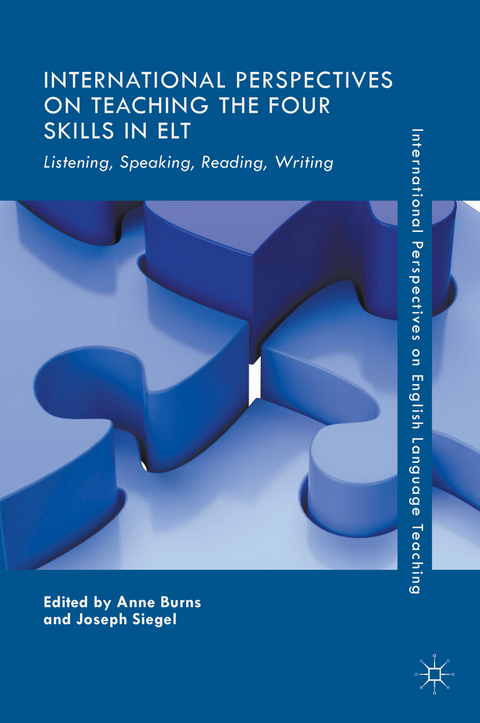
International Perspectives on Teaching the Four Skills in ELT
Springer International Publishing (Verlag)
978-3-319-63443-2 (ISBN)
Anne Burns is Professor of TESOL at the University of New South Wales, Australia, and Professor Emerita, at Aston University, UK. She has published extensively on teaching speaking, action research and language teacher education. Joseph Siegel is Senior Lecturer in the School of Humanities, Education and Social Science at Örebro University, Sweden. His research interests include action research, listening pedagogy, contextual education comparisons and pragmatic interaction.
Chapter 1. Teaching the four language skills: Themes and issues; Anne Burns and Joseph Siegel.- Part I. Listening.- Chapter 2. What teachers say about listening and its pedagogy: a comparison between two countries; Santos and Graham, United Kingdom and Brazil.- Chapter 3. L2 listening in China: An examination of current practice; Renandya and Hu, China.- Chapter 4. The development of a listening course for Japanese university students; McAuliffe and Brooks, Japan.- Chapter 5. Listening instruction for ESP: Exploring nursing education where English is a lingua franca; Tweedie and Johnson, Qatar.- Part II. Speaking.- Chapter 6. 'I can talk about a lot of things in the other language but not in English': Teaching speaking skills in Cameroon primary schools; Tante, Cameroon.- Chapter 7. Inquiry Dialogue: A genre for promoting teacher and student speaking in the classroom; Chappell, Australia.- Chapter 8. Teaching Dialogic Speaking Strategies in a Canadian EAP Program; Pang and Burri, Canada.- Chapter 9. Teaching Conversational English to Adult Learners via Skype: A Russian Perspective; Kozar. Part III. Reading.- Chapter 10. Supporting Elementary Students' Reading through Authentic Literature for Children; Vrastilová, Czech Republic.- Chapter 11. Teaching Reading to Encourage Critical Thinking and Collaborative Work; Murtiningsih and Hapsari, Indonesia.- Chapter 12. Reading Communities: Developing Autonomy through Community Building in an ESL Academic Reading Course; West, United States.- Chapter 13. Reading as Social Practice for Adult Immigrants: Talk around Text; Roach, New Zealand.- Part IV. Writing.- Chapter 14. Promoting Descriptive Writing through Culturally Relevant Literature; Hayik, Israel.- Chapter 15-Using Corrective Feedback on Writing to Enhance Vietnamese learners' autonomy; Pham and Iwashita, Vietnam.- Chapter 16. Promoting Self-Reflection in Writing: A Showcase Portfolio Approach; Lam, Hong Kong.- Chapter 17.'Localizing' second language writing pedagogy in a skills-integrated language program in Brazil; Villas Boas, Brazil.- Chapter 18. Future directions for the four skills; Joseph Siegel and Anne Burns.
"After reading it my expectations were fulfilled and I closed the book with many new ideas that had caught my attention. ... this volume provides the reader with an idea of how different perspectives and approaches are possible when tackling teaching problems and how these innovations might be implemented across contexts. This volume may be interesting for teacher-educators ... . It might also be attractive to teacher researchers, as it could prove a practical resource for their own research projects." (María Fernanda Rojas, Argentinian Journal of Applied Linguistics, Vol. 7 (2), November, 2019)
"A fascinating collection of testimonies from English teachers all over the world and their experiences on teaching the four skills. ... International Perspectives on Teaching the Four Skills in ELT: Listening, Speaking, Reading, Writing is a compelling read for both novice English teachers and experienced ones. ... this volume is highly recommendable and a good read." (Carla Florencia Lescano, Argentinian Journal of Applied Linguistics, Vol. 7 (1), May, 2019)
| Erscheinungsdatum | 29.10.2017 |
|---|---|
| Reihe/Serie | International Perspectives on English Language Teaching |
| Zusatzinfo | XIV, 260 p. 12 illus. |
| Verlagsort | Cham |
| Sprache | englisch |
| Maße | 155 x 235 mm |
| Gewicht | 578 g |
| Themenwelt | Schulbuch / Wörterbuch ► Wörterbuch / Fremdsprachen |
| Geisteswissenschaften ► Sprach- / Literaturwissenschaft ► Anglistik / Amerikanistik | |
| Geisteswissenschaften ► Sprach- / Literaturwissenschaft ► Germanistik | |
| Schlagworte | Autonomous learning • English • language education • Language: history & general works • Language: history & general works • language policy and planning • Language: reference & general • Language: reference & general • Language Teaching • Language teaching & learning • Language teaching & learning • Pedagogy • Psycholinguistics • regional differences • Social Sciences • Sociolinguistics • TEFL • TESOL |
| ISBN-10 | 3-319-63443-7 / 3319634437 |
| ISBN-13 | 978-3-319-63443-2 / 9783319634432 |
| Zustand | Neuware |
| Haben Sie eine Frage zum Produkt? |
aus dem Bereich


